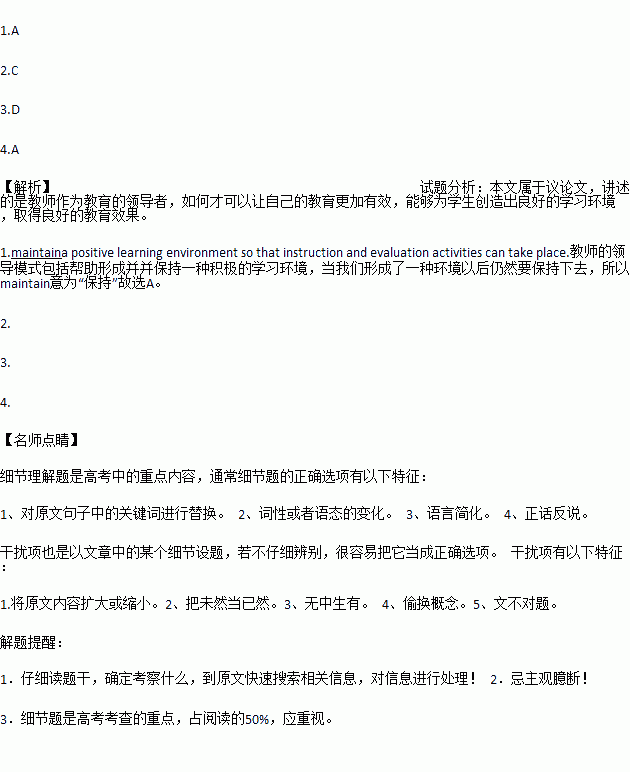题目内容
Teaching is more than leadership. Some of the teacher's time and effort are directed toward instruction, some toward evaluation. But it is the teacher as a group leader who creates an effective organizational structure and good working environment so that instruction and evaluation activities can take place. A group that is totally disorganized, unclear about its goal . or constantly fighting among its members will not be a good learning group. The pattern includes helping to form and maintain a positive learning environment so that instruction and evaluation activities can take place.
On the first day of class, the teacher faces a room filled with individuals (个体 ). Perhaps a few closely united groups and friendships already exist. But there is no sense of group unity, no set of rules for conduct in the group , no feeling of belonging. If teachers are successful leaders, they will help students develop a system of relationships that encourages working together.
Standards and rules must be set to keep order, make sure of justice and protect individual rights, but do not contradict(相悖) school policy. What happens when one student hurts another's individual rights? Without clear regulations agreeable to the students and teachers, the classroom can become chaotic,(混乱的). Students may break rules they did not know existed. If standards are set without participation from the class, students may spend a great deal of creative energy in destroying the class environment or finding ways to break rules.
No matter how skillful the teacher is in uniting students and creating a positive atmosphere, the task is never complete. Regular maintenance(维持) is necessary. Conflicts arise. The needs of individual members change. A new kind of learning task requires a new or organizational structure. Sometimes outside pressures such as holidays, upcoming tests or sport competitions, or family troubles cause stress in the classroom. One task for the teacher is to recreate a positive environment by helping students deal with conflict , change, and stress.
1.The underlined word “maintain" in Paragraph l probably means
A. keep B. build
C. recreate D. evaluate
2.According to the author, the teacher should .
A. free students from outside pressures
B. set the standards and rules on his own
C. be responsible for a well-organized class
D. focus more on instruction and evaluation
3.From the passage we can lean that .
A. rules cannot be changed once they're formed
B. outside pressures may not cause tension among students
C. if the teacher well units his students, he then will finish his task
D. if rules are not acceptable both to students and teachers, the classroom can be a mess
4.What is the author's main purpose of writing the passage?
A. To provide information for teaching.
B. To show the importance of' teaching a class.
C. To study the teacher's behavior in the classroom.
D. To compare the teacher's behavior with the students' in class.
Should doctors ever lie to benefit their patients to speed recovery or to cover the coming of death? In medicine as in law, government, and other lines of work, the requirements of honesty often seem dwarfed by greater needs; the need to protect patients from brutal news, to uphold a promise of secrecy or to advance the public interest.
What should doctors say, for example, to a 46-year-old man coming in for a routine physical checkup just before going on vacation with his family who, though he feels in perfect health, is found to have a form of cancer that will cause him to die within six months? Is it best to tell him the truth? If he asks, should doctors reject that he is ill, or minimize the gravity of the illness? Should they at least hide the truth until after the family vacation?
Doctors face such choices often. At times, they see important reasons to lie for the patients’ own sake; in their eyes, such lies differ sharply from self-serving ones.
Studies show that most doctors sincerely believe that the seriously ill patients do not want to know the truth about their condition, and that informing them of risks destroys their hope, so that they may recover more slowly, or deteriorate faster, perhaps even commit suicide.
But other studies show that, contrary to the belief of many physicians, a great majority of patients do want to be told the truth, even about serious illness, and feel cheated when they learn that they have been misled. We are also learning that truthful information, humanely conveyed, helps patients cope with illness; help them tolerate pain better with less medicine, and even recover faster after surgery.
There is an urgent need to debate this issue openly. Not only in medicine, but in other professions as well, practitioners may find themselves repeatedly in difficulty where serious consequences seem avoidable only through deception. Yet the public has every reason to know the professional deception, for such practices are peculiarly likely to become deeply rooted, to spread, and to trust. Neither in medicine, nor in law, government, or the social sciences can there be comfort in the old saying, “What you don’t know can’t hurt you.”
Title: 1. Or Not
Different 2. | ·Most doctors are in 3. of lying for the patients’ own sake. |
·A great majority of patients 4. on being told the truth. | |
Reasons for 5. lying to patients | ·Informing patients of the truth about their condition destroys their hope, 6. to recovering more slowly, or deteriorating faster, perhaps even 7. themselves. |
Reasons 8. lying to patients | ·The truthful information helps patients to 9. their illness, help them tolerate pain better with less medicine, and even recover faster after surgery. ·Most patients feel 10. when they learn that they have been misled. |

